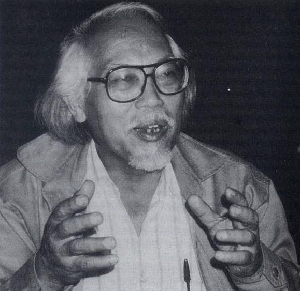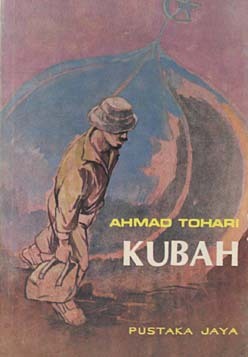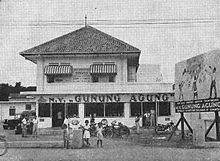Ishak Haji Muhammad, better known as Pak Sako, was a Malaysian writer, active in the 1930s until the 1950s. He was a nationalist and his involvement began before independence and continued thereafter. He fought for the idea of the unification of Melayu Raya where Indonesia, Malaysia and Brunei are united in one collective.

The Jakarta Special Capital Region is administratively equal to a province with special status as the capital of Indonesia. Instead of a mayor, the executive head of Jakarta is a governor. The governor of Jakarta is an elected politician who, along with the vice governor and 106 members of the Regional People's Representative Council (DPRD), is accountable for the strategic government of the city of Jakarta.
Anak Agung Pandji Tisna, also known as Anak Agung Nyoman Pandji Tisna, I Gusti Nyoman Pandji Tisna, or just Pandji Tisna, was the 11th descendant of the Pandji Sakti dynasty of Buleleng, Singaraja, which is in the northern part of Bali, Indonesia. He succeeded his father, Anak Agung Putu Djelantik, in 1944.

Yusuf Bilyarta Mangunwijaya, was an Indonesian architect, writer, and Catholic religious leader. He was popularly known as Romo Mangun.

Dalem Ketut was a king (Dalem) of Bali who ruled at an uncertain time during the age of the Javanese Majapahit Empire. While first a vassal ruler under the Majapahit kings, he later emerged as the king of a separate island realm. He was also known under the names Sri Smara Kepakisan or Tegal Besung. Dewa Tegal Besung is the earliest deified ruler who is honoured at the Pura Padharman Dalem Gelgel, the most important shrine at the central Balinese temple Pura Besakih.

Ajip Rosidi was an Indonesian poet and short story writer. As of 1983 he had published 326 works in 22 different magazines.
Kwitang is an administrative village (kelurahan) in the subdistrict (kecamatan) of Senen, Central Jakarta. It is one of the historic administrative village of Jakarta. The boundary of Kwitang is the Ciliwung to the west, Jalan Kramat Kwitang to the north, Jalan Kramat Raya to the east, and Jalan Kramat 4 to the south.

A. A. Hamidhan, is the popular name of Anang Abdul Hamidhan, an Indonesian freedom fighter and journalist from South Kalimantan. He established the daily Soeara Kalimantan in 1930. It was he who brought news of Indonesia's unilateral declaration of independence to Borneo.

Kubah is an Indonesian novel written by Ahmad Tohari. It follows a poor man named Karman who becomes a member of the Indonesian Communist Party, only to find himself a victim of the ongoing political struggles in 1950s Indonesia. After the Party's destruction he spends twelve years as a prisoner at Buru before returning to his hometown and becoming a devout Muslim.
Bali Post Media Group (BPMG) is an Indonesian media conglomerate founded by Ketut Nadha in 1948. Bali Post Media Group is said to be the largest media holder in Bali, Indonesia. It is led by ABG Satria Naradha, the son of Ketut Nadha, and has diversified businesses and interests in the Bali media industry. BPMG businesses include broadcast media, print media, online media, and a variety of other businesses.

Alexander Andries Maramis, more commonly known simply as A. A. Maramis, was an Indonesian politician and National Hero of Indonesia, who was involved in the struggle for independence. He was a member of the Investigating Committee for Preparatory Work for Independence (BPUPK), the organization which drafted the Constitution of Indonesia. In the early stages of the Indonesian government, following the Proclamation of Independence, he served as both Minister of Finance and Minister of Foreign Affairs. After the end of the Indonesian National Revolution, he served as the Indonesian ambassador to several nations, including the Philippines, West Germany, and the Soviet Union.
Toko Buku Gramedia is an Indonesian bookstore owned by Kompas Gramedia. Established in 1970, Gramedia Asri Media has contributed to give inspiration through knowledge, endeavor and direct participation to society for more than 50 years. Started in February 2, 1970 with the beginning of a small bookstore in West Jakarta. Providing more than 120 retail stores spread across 53 cities in 33 provinces, Gramedia Asri Media is expanding to have official online sales channels on all major platforms with more than one million active members and continues to grow under the Gramedia brand. Gramedia Asri Media is reinforced by six major publishers which have released more than 100,000 book titles, making Gramedia Asri Media the largest publisher and book retail group in Southeast Asia. In addition to providing books, Gramedia also offers a variety of other products, such as stationery, office supplies, and sports equipment.
Moeslim Taher, S.H. was an Indonesian educator who founded Jayabaya University on October 5, 1958. Taher was later appointed become 2nd rector of the Jayabaya University for the period 1962–1988 replacing Prof. Mr. S. A. Hakim as first rector. In addition, Taher was appointed by Soeharto as the Supreme Advisory Council of the Republic of Indonesia from 1983 to 1988.

KDB Pejuang (P-03) / KRIBadau (841) is the second ship of Waspada class built up in the late 1970s, one of three ordered in Singapore. She was launched on 1978, and was in service with the Royal Brunei Navy until 2011, when she was sold to the Indonesian Navy.She is currently active in Indonesia service as KRI Badau.

Sabam Gunung Panangian Sirait was a senior Indonesian politician. He was a member of the DPD RI from 15 January 2018 until his death on 29 September 2021. Sabam is the father of the Indonesian House of Representatives and PDIP member Maruarar Sirait.
Indonesian honorifics are honorific titles or prefixes used in Indonesia covering formal and informal social, commercial relationships. Family pronouns addressing siblings are used also in informal settings and are usually gender-neutral. Pronouns vary by region/ethnic area and depend on the ethnic group of the person spoken to. In addition to being gender- and ethnic-based, pronouns are often seniority-based and even profession-based.

Buda Script or (Aksara Buda) or Gunung Script is an archaic script. Based on its shape, the Buda Script still has a close relationship with the Kawi script. This script was previously used on the island of Java and Bali. This type of script is called the Buda script because it is considered to have originated from the pre-Islamic era which is called the Buddhist Age. The word Buda is based on the Buddha word. Manuscripts containing writing using the Buda script are commonly found in mountainous areas. Because of that, this type of script is also called the "Mountain script".










